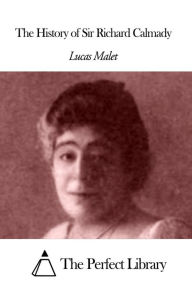Lucas Malet
Lucas Malet was the pseudonym of Mary St Leger Kingsley (4 June 1852 — 27 October 1931), a Victorian novelist. Of her novels, The Wages of Sin (1891) and The History of Sir Richard Calmady (1901) were especially popular. Malet scholar Talia Schaffe
... Read more
Lucas Malet was the pseudonym of Mary St Leger Kingsley (4 June 1852 — 27 October 1931), a Victorian novelist. Of her novels, The Wages of Sin (1891) and The History of Sir Richard Calmady (1901) were especially popular. Malet scholar Talia Schaffer notes that she was "widely regarded as one of the premier writers of fiction in the English-speaking world" at the height of her career, but her reputation declined by the end of her life and today she is rarely read or studied. At the height of her popularity, she was "compared favorably to Thomas Hardy, and Henry James, with sales rivaling Rudyard Kipling." Malet's fin de siecle novels offer "detailed, sensitive investigations of the psychology of masochism, perverse desires, unconventional gender roles, and the body."
In 1876, she married the Rev. William Harrison, a colleague of her father's, Minor Canon of Westminster, and Priest-in-Ordinary to the Queen. Malet gave up artistic aspirations after the marriage. The marriage was childless and unhappy, and the couple soon separated. After the separation, Malet embarked on an independent writing career, forming her pen name by combining two little-known family names. Her first novel, Mrs. Lorimer, a Sketch in Black and White, was published in 1882. Critical attention and praise came with Malet's second novel, Colonel Enderby's Wife, published in 1885, which fictionalized her brief failed marriage. Five years after her husband's death, Kingsley became a convert to Catholicism.
Malet lived for most of her life on the Continent with the singer Gabrielle Vallings. Vallings, much younger than Malet, was the author's cousin, romantic companion, and adopted daughter. The two traveled abroad frequently together, including spending significant time in France. Malet spent much of the end of her life in France where she was a part of "high literary circles." She wrote frequently during this time, often out of economic necessity. Despite her tremendous critical and economic success during the height of her career, Malet died in penury at the home of a friend in Wales on 27 October 1931.
Less


























.jpg)
.jpg)
.jpg)
.jpg)
.jpg)
